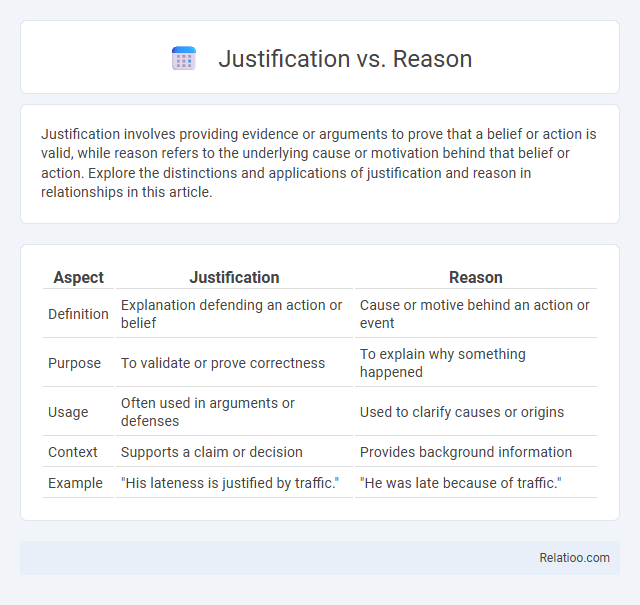Justification involves providing evidence or arguments to prove that a belief or action is valid, while reason refers to the underlying cause or motivation behind that belief or action. Explore the distinctions and applications of justification and reason in relationships in this article.
Table of Comparison
| Aspect | Justification | Reason |
|---|---|---|
| Definition | Explanation defending an action or belief | Cause or motive behind an action or event |
| Purpose | To validate or prove correctness | To explain why something happened |
| Usage | Often used in arguments or defenses | Used to clarify causes or origins |
| Context | Supports a claim or decision | Provides background information |
| Example | "His lateness is justified by traffic." | "He was late because of traffic." |
Understanding Justification and Reason: Key Differences
Understanding justification and reason involves recognizing that a reason explains why something is done or believed, providing the basis or cause behind an action or thought. Justification, on the other hand, refers to the evidence or arguments presented to prove that an action or belief is right or valid. Your ability to differentiate between these two concepts enhances critical thinking and decision-making processes by clarifying whether you are identifying causes (reasons) or defending correctness (justifications).
Definitions: What is Justification?
Justification is the process or evidence that proves a claim or action to be right, reasonable, or necessary, providing valid grounds for belief or conduct. It differs from a reason, which is the cause or explanation for something, while justification offers a defensible basis that supports the truth or appropriateness of that reason. Your understanding of justification helps clarify why certain decisions or beliefs are considered acceptable or valid in logic, law, and daily reasoning.
Defining Reason: More Than Just Logic
Reason encompasses more than mere logic; it involves the cognitive process of making sense of experiences, beliefs, and actions through rational thought and interpretation. Unlike justification, which specifically aims to provide evidence or arguments supporting a claim, reason includes the broader capacity for understanding and explaining phenomena. This distinction highlights reason as a foundational mental faculty that underpins justification by enabling coherent and meaningful explanations beyond strict logical structures.
Historical Perspectives on Justification and Reason
Historical perspectives on justification and reason reveal distinct philosophical developments: justification traditionally involves providing evidence or arguments to support beliefs or actions, while reason encompasses the broader capacity for logical thinking and understanding. In classical philosophy, justification was closely tied to epistemology and the validation of knowledge claims, whereas reason was seen as the fundamental faculty enabling critical analysis and rational decision-making. Your exploration of these concepts benefits from recognizing how thinkers like Aristotle and Kant shaped the interplay between justification as proof and reason as a cognitive process.
Philosophical Approaches to Justification vs Reason
Philosophical approaches to justification emphasize the necessity of providing a well-founded basis for beliefs, distinguishing it from mere reasons, which are often seen as causes or motivations without guaranteeing truth. Justification demands that Your beliefs are supported by evidence or logical coherence, ensuring epistemic validity rather than subjective explanation. While reasons explain why a belief arises, justification evaluates the epistemic credentials that make a belief rational and reliable.
Justification in Everyday Decision-Making
Justification in everyday decision-making involves providing clear and logical explanations for choices, ensuring that decisions align with personal values and practical outcomes. Unlike reasons, which simply state motives or causes, justifications validate decisions by demonstrating their appropriateness within specific contexts. This process strengthens confidence and accountability, facilitating more thoughtful and responsible actions in daily life.
The Role of Reason in Critical Thinking
The role of reason in critical thinking is pivotal for evaluating arguments and drawing logical conclusions based on evidence. Reason enables individuals to differentiate between mere justification, which supports beliefs, and the deeper rational foundations that validate those beliefs through coherent explanation and consistency. Effective critical thinking relies on reason to systematically assess the validity and soundness of justifications, ensuring decisions are well-grounded and unbiased.
Comparing Justification and Reason in Ethics
Justification in ethics refers to providing valid grounds or evidence that make an action morally acceptable, while reason involves the underlying logical thought process or motive driving a decision. Justification often addresses external validation and societal norms, whereas reason focuses on internal cognitive rationale for ethical behavior. Both concepts are crucial in ethical theory, with justification supporting the acceptability of actions and reason explaining the intentionality behind those actions.
Examples: Justification vs Reason in Real-Life Scenarios
A justification explains why an action is appropriate, such as citing safety concerns to validate a fire drill, while a reason simply identifies a cause, like the fire alarm ringing. For example, a student missing class may give the reason of illness, but the justification could involve a doctor's note confirming the severity. In legal cases, a defendant's reason for driving over the speed limit might be an emergency, but the justification requires proof that the emergency warranted exceeding speed limits.
Conclusion: Why Distinguishing Justification from Reason Matters
Distinguishing justification from reason clarifies the foundation of beliefs and actions, enhancing critical thinking and decision-making quality. Justification involves providing evidence or arguments supporting a belief, while a reason refers to the motivation or cause behind that belief or action. Understanding this difference improves logical analysis, ethical evaluations, and effective communication in philosophical and practical contexts.

Infographic: Justification vs Reason
 relatioo.com
relatioo.com